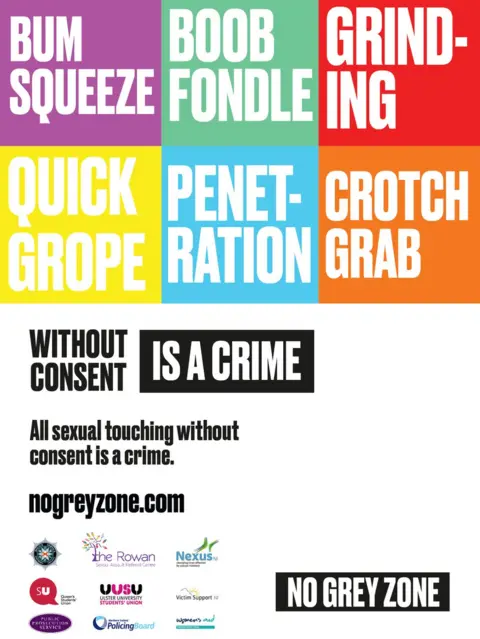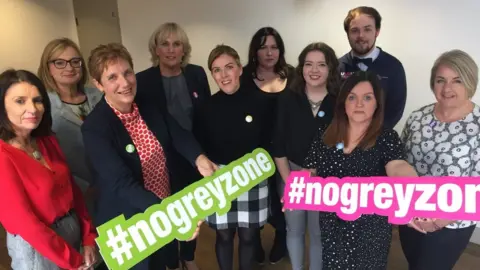Sexual consent campaign launched by PSNI
 PSNI
PSNIA new campaign to educate young people about sexual consent has been launched by the Police Service of Northern Ireland (PSNI) and other agencies.
Entitled "No Grey Zone", the awareness campaign sets out the type of behaviour that will be treated as sexual assault unless consent has been granted.
It also calls for clear communication, explaining what constitutes both verbal and non-verbal consent.
It follows a 9.3% rise in sex offences reported to the PSNI in the last year.
'Clear language'
The PSNI's initiative is being supported by prosecutors, sexual violence charities and student unions at both Ulster University and Queen's University, Belfast.
"Over the past number of years we have seen an increase in the number of sexual crimes being reported and we wanted to develop a campaign to educate young people about sexual consent and send the clear message that there is No Grey Zone," said Det Ch Supt Paula Hilman.
"The campaign is specifically aimed at the target audience of 16 to 28 year olds. It uses clear language to give examples of sexual assault and brings the topic into the open in an unapologetic way.
"It is robust and fact based. We want people to hear and understand this message and start talking about sexual consent."
 PSNI
PSNIThe PSNI have described their campaign as both a "mindset" and a "movement".
No Grey Zone includes a dedicated website which aims to explain boundaries and help sexual assault victims access support.
'Changed conversation'
PSNI officers recorded 3,528 reports of sexual offences between September 2017 and August 2018, compared to 3,229 during the previous 12 months, a rise of 9.3%.
However, they are concerned that many sexual assaults go unreported, and have called for all victims to come forward.
"As part of our research for the campaign we worked closely with Queen's Students' Union and the findings from their Stand Together Report which showed that just over 4% of students who said they had been sexually assaulted reported it to the police," said Det Ch Supt Hilman.
"We want you to know that if you take the brave step of reporting it to police, you will be listened to, respected, treated sensitively, have your report thoroughly investigated and you will be signposted to support services."
Queen's Students' Union has already begun to address the issue of sexual violence and has been running consent workshops for students.
Its student welfare officer, Sinéad Henry, said the union has "worked hard to ensure consent is a core part of what we do".
"I am hopeful this campaign will show that consent is important to the PSNI and to Queen's Students' Union and that it is vital to receive it before making any sexual contact."